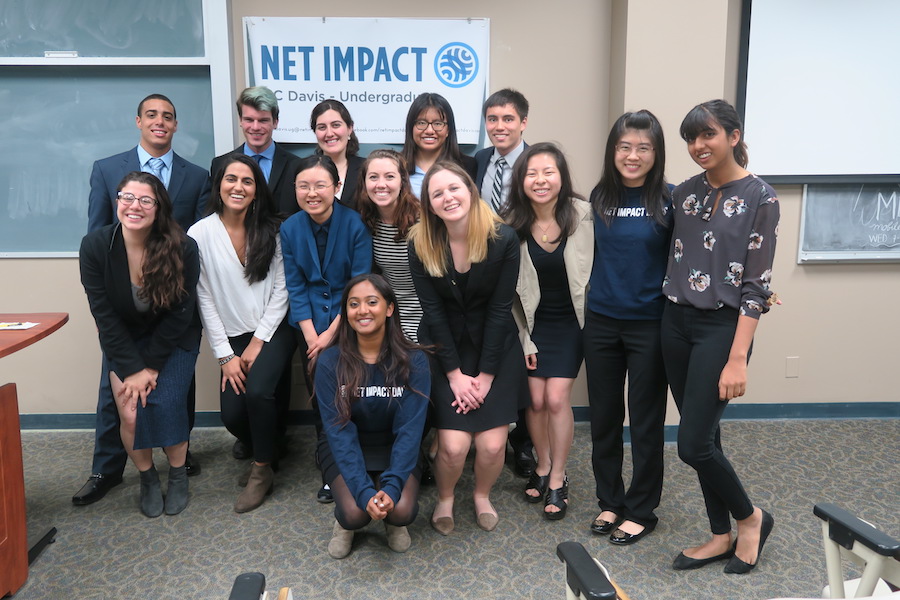
Nonprofit group seeks to improve community
There is no shortage of UC Davis clubs and organizations dedicated to benefitting the community and making positive changes in the world. One such club is Net Impact, a nonprofit social and environmental entrepreneurship organization. Net Impact is an international organization with chapters in numerous universities around the world, but the UC Davis chapter was started just this year by Nivi Achanta, a fourth-year managerial economics and statistics double major. Achanta, who serves as the club’s president, wanted to focus the efforts of the Davis chapter on an area particularly pertinent to the Davis community.
“We wanted to do something with respect to sustainability on a very targetable and local scale,” Achanta said. “Once we recruited enough people in Fall Quarter that’s when we were really able to figure out our mission.”
The club is split into three interdisciplinary teams, each focused on a specific project. The teams develop their project in three phases, each of which last one quarter. During Fall Quarter the project is designed, Winter Quarter focuses on strategy and research and in Spring Quarter the project is implemented.
The teams also have to work on getting their projects funded — an integral part of any nonprofit organization. Although some funding is provided by ASUCD and the Innovation Institute for Food and Health, much of it depends on the Net Impact members themselves.
“We have an annual pitchfest to a panel of potential investors,” Achanta said. “These people decide how valuable and doable our projects are and then they give each of us either full or partial funding.”
The three projects are each headed by project managers, who are responsible for overseeing the projects and ensuring that their team fulfills all of its objectives.
One of these managers is Brooke Garcher, a third-year environmental design major and the leader of the waste management team. Garcher, also the club’s director of outreach, had her team focus on expanding compost on campus, both in terms of adding more compost bins and educating people on waste sorting.
“We knew that where composting existed, like at the CoHo or Silo, it was very successful,” Garcher said. “But they’re only at food places. So when you take your coffee cup to go, you throw it in the trash which ends up piling a lot. A lot of the waste in landfills could be compostable.”
Garcher, who aims to implement compost bins on a building-to- building basis, began contacting on-campus buildings such as Shields Library to conduct trial runs.
“During week 10 and finals week we’re going to have several compost bins at the library,” Garcher said. “We’re gonna be monitoring the data and hopefully we can make the bins a permanent mainstay.”
Another project manager is Maria Arteaga, a third-year managerial economics major. Arteaga, who will take over for Achanta as club president next year, heads the education project. Arteaga acknowledged the fact that the current divisive political climate has made education and understanding other cultures as important as ever. Arteaga and her team created a program that connects UC Davis students to students abroad through sister schools and schools that UC Davis has already partnered with.
“What we’re trying to do is create a seminar, where a pilot group of 10 students can come in and log on to the country’s most used chat and video platforms and start talking about themselves and get to know each other,” Arteaga said. “They would then lead into their education and how living in their community has impacted their lives. Eventually they would identify a problem in their community and using everything they learned about each other to create a solution.”
Artega stated that her team’s main goal was to give students a chance to work together on an international scale.
“We feel like collaboration is key, and we want to provide that opportunity for that international experience due to money or government policies,” Arteaga said.
Achanta, who started the club at the beginning of Fall Quarter, stated that the opportunity to collaborate with a diverse range of people was one of the main driving forces behind founding the club.
“I wanted to work with people from different backgrounds, and I never had the opportunity to collaborate with people from different majors,” Achanta said. “Our entire founding board is a different major and I think that’s one of the reasons we’ve been so successful.”
Net Impact has attracted numerous students with the same mindset as Achanta, also looking to make a legitimate difference in their community and the world at large.
“[Net Impact] is very driven by the club members,” Arteaga said. “We’ve got a lot of members who have really great ideas to make really feasible projects.”
One of Achanta’s main objectives is to spread awareness of the club and continue to add on to the team, as Net Impact’s ability to make a difference increases with each student that joins the club.
“Outreach is something that’s always been very important to us,” Achanta said. “We’re constantly reaching reaching out to people to try to recruit the best talent.”
Although Net Impact is still a relatively new club, it is quickly growing both in popularity and impact. Students from around campus who want to help other people and make a difference are joining the club, and due to this, Achanta and her team have high aspirations for Net Impact.
Written by: Eddy Zhu — campus@theaggie.org



